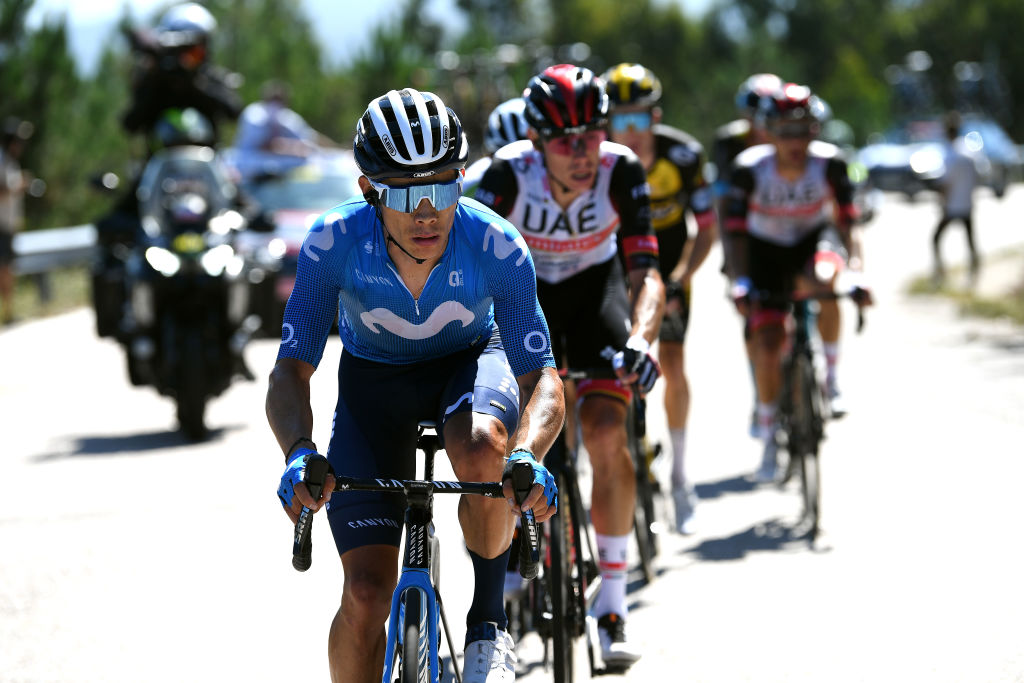López describes dramatic Vuelta abandon and Movistar exit in documentary
Third series of 'El Día Menos Pensado' released this week

The long-awaited third series of Movistar's 'fly-on-the-wall' documentary, El Día Menos Pensado (The Least Expected Day') reveals a wealth of inside details on Colombian star Miguel Ángel López and his exit from the squad after a hugely controversial decision to abandon the 2021 Vuelta a España.
The winner of the Vuelta's toughest mountain stage to El Gamoniteiru just a few days earlier, López was lying third overall on the second last stage of the Vuelta when he opted to quit.
López had attempted to chase down a move containing rivals for his podium position as well as Movistar co-leader Enric Mas, second overall, during the last part of the hilly stage through Galicia. But as his chase quickly grew increasingly fruitless, (although the strength of that argument remains clear) he was ordered to stop by the team sports management.
Furious at the decision, López quit the race and then left the team altogether a few weeks later. He subsequently re-signed with his previous squad, Astana Qazaqstan.
The third season of the series, released this week, reveals how López and Mas were embroiled in an increasingly tense stand-off during the Vuelta, well before the Colombian decided to abandon.
On stage 9 to the crunch summit finish of Velefique, López had set the pace on the climb. However, he subsequently was far from happy when Mas responded to an attack by the eventual overall winner, Primož Roglič (Jumbo-Visma), and then forged on despite messages from the management urging Mas to wait for Lopez.
"Logically I didn't understand why Enric was going flat out," López insisted in the documentary. "It was better that I reached them."
"It was a good situation for the team," Mas countered later."And that was when I took my radio out" – something he later said had been a mistake.
"I was angry because I lost confidence [in the team] at that point. Something had been lost," Lopez added.
Get The Leadout Newsletter
The latest race content, interviews, features, reviews and expert buying guides, direct to your inbox!
The communication breakdown continued apace during the race, despite a 'summit meeting' between the riders to try and resolve it, with López launching his own moves on the Pico de Villuercas and Gaimoniteiru stages, winning the second. But the real showdown was to come on stage 20, the last mass start stage of the Vuelta.
On one of the innumerable climbs mid-way through the stage, an attack went up the road containing GC contenders Adam Yates (Ineos Grenadiers) and two Bahrain-Victorious riders, one of whom, Jack Haig, was fighting for the podium.
However, the crunch issue for Movistar was that while Mas and Roglič were both in on the move, Lopez was not.
"My first mistake was not to be up there when I needed to be, the second was Enric…saying 'Migue' don't drive behind'," Lopez, who led the pursuit behind, said. In the documentary, Mas can be heard saying this phrase on the radio, but he insisted afterwards that in fact, he said "Migue', don't work. For fuck's sake, attack".
Mas subsequently explained that his request was phrased so that López could see he had to try a solo breakaway move rather than dragging the whole group of chasers up to the leaders with a steady pace. But López failed to see it that way.
"I was confused, they told me not to push on, because there would be attacks from behind and we were still all close. But they practically prevented me from having an opportunity to fight," López later complained. "If felt like lost faith in me very quickly."
At one point, amidst a mass of increasingly fraught conversations between riders and the team cars, López was urged to stop chasing by team manager Eusebio Unzué in person, telling him that "you're going to burn yourself out." Then, as the gap yawned open between the two groups and López's chance of a third-place overall went up in smoke, the Colombian opted to quit, uttering the now infamous phrase, "Gentlemen, I'm ending this here. It's been a pleasure."
This was despite various conversations with a teammate, sports directors and even, later, his wife about what his course of action should be.
"I told him to go for it and really attack," said José Joaquín Rojas, who attempted to organise a chase behind. "To give it two balls worth and show what he could really do. 500 metres later, I see him in the car."
López himself issued a damning conclusion during the documentary concerning the management of the Movistar team.
"It's been shown and re-shown that they don't know how to handle its leaders. It didn't work with Nairo [Quintana], [Mikel] Landa, and it didn't work with me."
It appears that López's decision to quit in such a dramatic fashion was not just a moment of rage, but was also because he no longer wanted to remain with the team, either. This was despite re-signing with the squad just two days before the Vuelta began.
"I told [performance manager Patxi Vila] I just want them to throw me out of the team," he added at another point by way of explanation. "And to do it now."
Alasdair Fotheringham has been reporting on cycling since 1991. He has covered every Tour de France since 1992 bar one, as well as numerous other bike races of all shapes and sizes, ranging from the Olympic Games in 2008 to the now sadly defunct Subida a Urkiola hill climb in Spain. As well as working for Cyclingnews, he has also written for The Independent, The Guardian, ProCycling, The Express and Reuters.
